新概念一册l119-121课重难点和练习汇编
新概念一册l119-121课重难点和练习
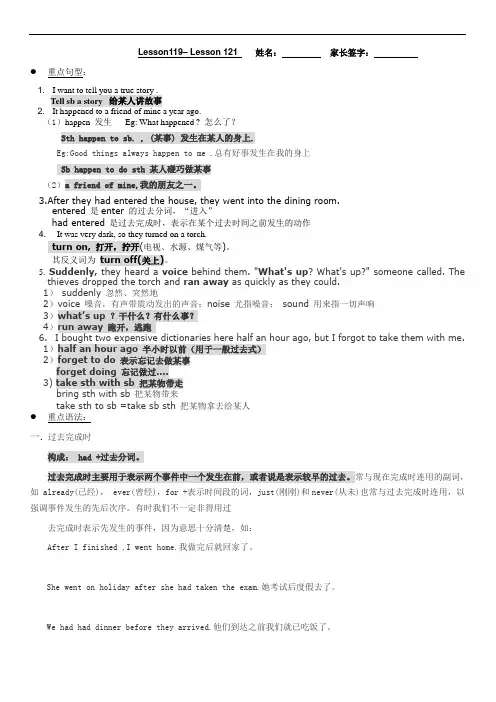
Lesson119– Lesson 121 姓名:家长签字:●重点句型:1. I want to tell you a true story .Tell sb a story 给某人讲故事2. It happened to a friend of mine a year ago.(1)happen 发生Eg: What happened ? 怎么了?Sth happen to sb. , (某事) 发生在某人的身上.Eg:Good things always happen to me .总有好事发生在我的身上Sb happen to do sth 某人碰巧做某事(2)a friend of mine,我的朋友之一。
3.After they had entered the house, they went into the dining room.entered 是enter 的过去分词,“进入”had entered 是过去完成时,表示在某个过去时间之前发生的动作4. It was very dark, so they turned on a torch.turn on, 打开,拧开(电视、水源、煤气等)。
其反义词为turn off(关上)。
5. Suddenly, they heard a voice behind them. "What's up? What's up?" someone called. Thethieves dropped the torch and ran away as quickly as they could.1)suddenly 忽然、突然地2)voice 嗓音,有声带震动发出的声音;noise 尤指噪音;sound 用来指一切声响3)what’s up ?干什么?有什么事?4)run away 跑开,逃跑6. I bought two expensive dictionaries here half an hour ago, but I forgot to take them with me.1)half an hour ago 半小时以前(用于一般过去式)2)forget to do 表示忘记去做某事forget doing 忘记做过….3) take sth with sb 把某物带走bring sth with sb 把某物带来take sth to sb =take sb sth 把某物拿去给某人●重点语法:一. 过去完成时构成: had +过去分词。
新概念英语第一册Lesson119-120笔记(语法点+配套练习+答案)
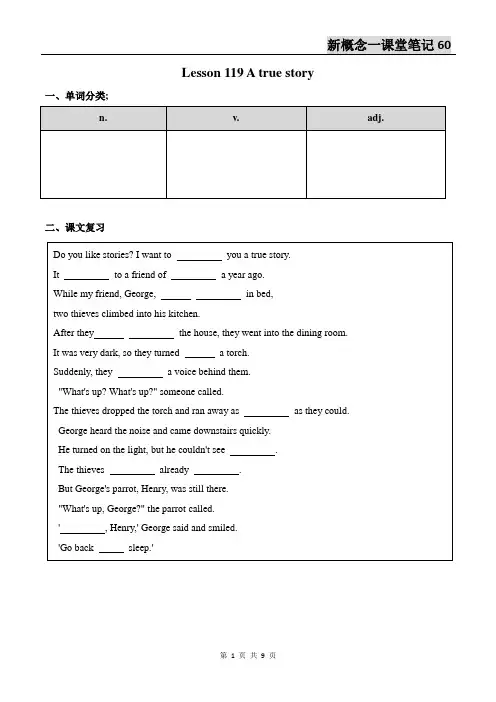
12. The studentswere reading(read) English when the teacher came in.
13. Look! The monkeyis climbing(climb) the tree.
I’d like you to meet a friend ofmine(I).
enter
1.v.t.进入
=go into
2.v.t.参加
enter the army参军
3.enter for报名参加
n.entrance入口
She entered the room quiety.
她悄悄地进入屋中。
Heenteredthe universityatthe age of 21.
--- I lost my wallet.
---Whendidithappen(happen)?
--- Yesterday afternoon.
Good things always happentome.
I don’t believe that.
我不相信这事发生在他身上。
My motherhappenedtofind my keytothe front door in the garden.
他21岁上了大学。
Alotofstudentsenteredforthis competition(比赛).
很多学生报名参加这个竞赛。
dark
1.adj.黑的,暗的
2.adj.深色的
3.n.天黑
before the dark天黑以前
2020最新新概念英语第1册课文详注Lesson119~126
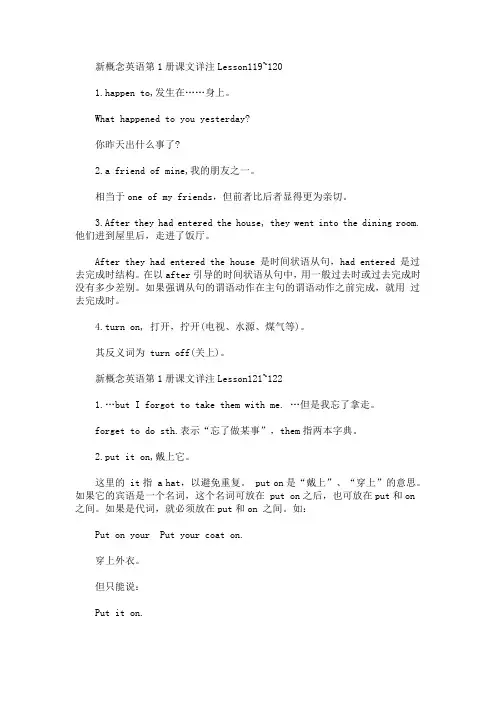
新概念英语第1册课文详注Lesson119~1201.happen to,发生在……身上。
What happened to you yesterday?你昨天出什么事了?2.a friend of mine,我的朋友之一。
相当于one of my friends,但前者比后者显得更为亲切。
3.After they had entered the house, they went into the dining room. 他们进到屋里后,走进了饭厅。
After they had entered the house 是时间状语从句,had entered 是过去完成时结构。
在以after引导的时间状语从句中,用一般过去时或过去完成时没有多少差别。
如果强调从句的谓语动作在主句的谓语动作之前完成,就用过去完成时。
4.turn on, 打开,拧开(电视、水源、煤气等)。
其反义词为 turn off(关上)。
新概念英语第1册课文详注Lesson121~1221.…but I forgot to take them with me. …但是我忘了拿走。
forget to do sth.表示“忘了做某事”,them指两本字典。
2.put it on,戴上它。
这里的 it指 a hat,以避免重复。
put on是“戴上”、“穿上”的意思。
如果它的宾语是一个名词,这个名词可放在 put on之后,也可放在put和on 之间。
如果是代词,就必须放在put和on 之间。
如:Put on your Put your coat on.穿上外衣。
但只能说:Put it on.把它穿上。
新概念英语第1册课文详注Lesson123~1241.What a beautiful ship!多漂亮的轮船啊!what引导的感叹句通常是由 What + a(n)+形容词+名词构成的。
2.That's right.对。
这句是对上面附加疑问句的回答。
新概念英语一lesson119-120(共20页)

• George heard the noise and came downstairs quickly. • heard the noise 听到声响 • came downstairs 下楼来 • He turned on the light, but he couldn’t see anyone. The thieves had already gone. • turn on the light 开灯 • someone用在肯定句中 • anyone用在否定句中
过去完成时
• • • • • • 过去完成时构成形式: had+ 过去分词 否定式:在had的后面加not 疑问句式:把had提前 我在干家务之前已经完成了作业。 I had finished my homework before I did the house work. • I had not finished my homework before I did the house work. • Had you finished your homework before you did the house work?
• • • • • • • • •
torch n. 1) 手电筒 开手电筒 turn on a torch 关手电筒 turn off a torch 2)火炬 Kindle a torch 燃起火炬 torch relay 火炬传递
• • • • • • • • • • •
voice n. 1) 声音 in an angry voice 以生气的声音 以伤心的声音 in a sad voice 他以伤心的声音告诉了我这个消息。 He told me this news in a sad voice. lose one’s voice 嗓子变哑 我因重感冒,嗓子都哑了。 I’ve lost my voice because of a bad cold.
新概念英语第一册课后答案Lesson119~124
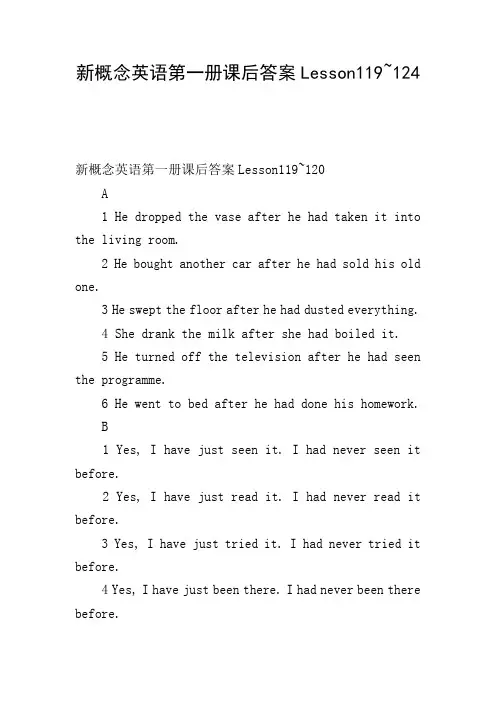
新概念英语第一册课后答案Lesson119~124新概念英语第一册课后答案Lesson119~120A1 He dropped the vase after he had taken it into the living room.2 He bought another car after he had sold his old one.3 He swept the floor after he had dusted everything.4 She drank the milk after she had boiled it.5 He turned off the television after he had seen the programme.6 He went to bed after he had done his homework.B1 Yes, I have just seen it. I had never seen it before.2 Yes, I have just read it. I had never read it before.3 Yes, I have just tried it. I had never tried it before.4 Yes, I have just been there. I had never been there before.5 Yes, I have just written a letter in English. I had never written a letter in English before.6 Yes, I have just watched this programme. I had never watched this programme before.C1 It was too late. He had already painted it.2 It was too late. She had already dusted it.3 It was too late. You had already telephoned him.4 It was too late. You had already corrected it.5 It was too late. They had already shut it.6 It was too late. She had already made it.D1 I went to the doctor after I had made an appointment.2 The boss left the office after he had finished work.3 My wife went out after she had finished the housework.4 My teacher gave me my exercise book after he had corrected it.5 My sister went on holiday after she had taken the examination.6 I bought a new car after I had sold my old one. 新概念英语第一册课后答案Lesson121~122A1 This is the car which the mechanic repaired yesterday.2 He is the man whom I invited to the party.3 These are the things which I bought yesterday.4 He is the man who came here last week.5 He is the policeman who caught the thieves.6 She is the nurse who looked after me.7 She is the woman whom I met at the party.8 I am the person who wrote to you.B1 Who met him? That woman? Yes, she’s the woman who met him.2 Who sat there? That man? Yes, he’s the man who sat there.3 Who made it? That woman? Yes, she’s the woman who made it.4 Who read it? That man? Yes, he’s the man who read it.5 Who shut it? That man? Yes, he’s the man who shut it.6 Who took it? That woman? Yes, she’s the woman who took it.7 Who told me? That man? Yes, he’s the man who toldme.8 Who saw me? That woman? Yes, she’s the woman who saw me.C1 Whom did you see? That man? Yes, he’s the man whom I saw.2 Whom did you telephone? That woman? Yes, she’s the woman whom I telephoned.3 Whom did you invited? That man? Yes, he’s the man whom I invited.4 Whom did you to the to the cinema? That man? Yes, he’s the man whom I took to the cinema.5 Whom did you find in the garden? That man? Yes, he’s the man whom I found in the garden.6 Whom did you drive to London? That woman? Yes, she’s the woman whom I drove to London.7 Whom did you hear? That woman? Yes, she’s the woman whom I heard.8 Whom did you remember? That man? Yes, he’s the man whom I remembered.新概念英语第一册课后答案Lesson123~124A1 She is the woman I drove to London.2 That’s the film I saw.3 That’s the man I spoke to.4 They are the thieves the police caught.5 These are the letters I typed.6 These are the people you asked me about.B1 Which man? That man? Yes, that’s the man I saw yesterday.2 Which car? That car? Yes, that’s the car I repaired yesterday.3 Which woman? That woman? Yes, that’s the womanI drove to London yesterday.4 Which umbrella? That umbrella? Yes, that’s the umbrella I bought yesterday.5 Which medicine? That medicine? Yes, that’s the medicine I took yesterday.6 Which man? That man? Yes, that’s the man I invited to my house yesterday.C1 That’s right. This is the village I wrote to you about.2 That’s right. He is the person I have heard about.3 That’s right. This is the test I spoke to you about.4 That’s right. She is the woman I read about.5 That’s right. This is something(new) I haven’t thought about.6 That’s right. This is something I must decide about.。
新概念第一册第119-120课语法重点
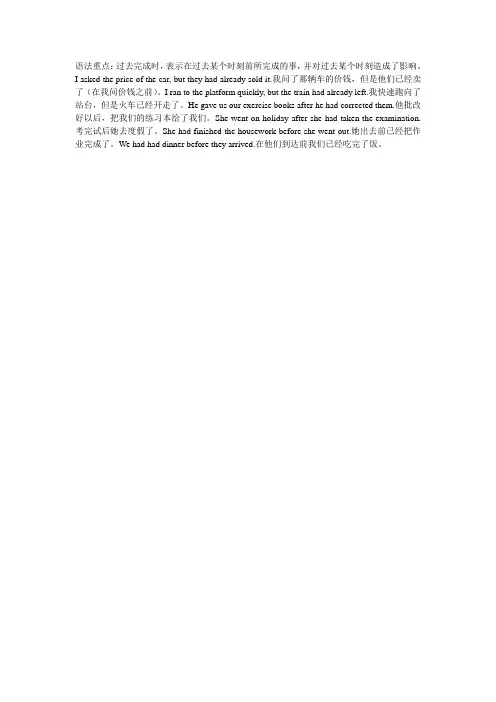
语法重点:过去完成时,表示在过去某个时刻前所完成的事,并对过去某个时刻造成了影响。
I asked the price of the car, but they had already sold it.我问了那辆车的价钱,但是他们已经卖了(在我问价钱之前)。
I ran to the platform quickly, but the train had already left.我快速跑向了站台,但是火车已经开走了。
He gave us our exercise books after he had corrected them.他批改好以后,把我们的练习本给了我们。
She went on holiday after she had taken the examination.考完试后她去度假了。
She had finished the housework before she went out.她出去前已经把作业完成了。
We had had dinner before they arrived.在他们到达前我们已经吃完了饭。
新概念一册l119-121课重难点和练习
新概念一册l119-121课重难点和练习Lesson119– Lesson 121 姓名:家长签字:●重点句型:1. I want to tell you a true story .Tell sb a story 给某人讲故事2. It happened to a friend of mine a year ago.(1)happen 发生Eg: What happened ? 怎么了?Sth happen to sb. , (某事) 发生在某人的身上.Eg:Good things always happen to me .总有好事发生在我的身上Sb happen to do sth 某人碰巧做某事(2)a friend of mine,我的朋友之一。
3.After they had entered the house, they went into the dining room.entered 是enter 的过去分词,“进入”had entered 是过去完成时,表示在某个过去时间之前发生的动作4. It was very dark, so they turned on a torch.turn on, 打开,拧开(电视、水源、煤气等)。
其反义词为turn off(关上)。
5. Suddenly, they heard a voice behind them. "What's up? What's up?" someone called. Thethieves dropped the torch and ran away as quickly as they could.1)suddenly 忽然、突然地2)voice 嗓音,有声带震动发出的声音;noise 尤指噪音;sound 用来指一切声响3)what’s up ?干什么?有什么事?4)run away 跑开,逃跑6. I bought two expensive dictionaries here half an hour ago, but I forgot to take them with me.1)half an hour ago 半小时以前(用于一般过去式)2)forget to do 表示忘记去做某事forget doing 忘记做过….3) take sth with sb 把某物带走bring sth with sb 把某物带来take sth to sb =take sb sth 把某物拿去给某人●重点语法:一. 过去完成时构成: had +过去分词。
新概念英语第一册课后答案Lesson119~124(最新)
新概念英语第一册课后答案Lesson119~120A1 He dropped the vase after he had taken it into the living room.2 He bought another car after he had sold his old one.3 He swept the floor after he had dusted everything.4 She drank the milk after she had boiled it.5 He turned off the television after he had seen the programme.6 He went to bed after he had done his homework.B1 Yes, I have just seen it. I had never seen it before.2 Yes, I have just read it. I had never read it before.3 Yes, I have just tried it. I had never tried it before.4 Yes, I have just been there. I had never been there before.5 Yes, I have just written a letter in English. I had never writtena letter in English before.6 Yes, I have just watched this programme. I had never watched this programme before.C1 It was too late. He had already painted it.2 It was too late. She had already dusted it.3 It was too late. You had already telephoned him.4 It was too late. You had already corrected it.5 It was too late. They had already shut it.6 It was too late. She had already made it.D1 I went to the doctor after I had made an appointment.2 The boss left the office after he had finished work.3 My wife went out after she had finished the housework.4 My teacher gave me my exercise book after he had corrected it.5 My sister went on holiday after she had taken the examination.6 I bought a new car after I had sold my old one.新概念英语第一册课后答案Lesson121~122A1 This is the car which the mechanic repaired yesterday.2 He is the man whom I invited to the party.3 These are the things which I bought yesterday.4 He is the man who came here last week.5 He is the policeman who caught the thieves.6 She is the nurse who looked after me.7 She is the woman whom I met at the party.8 I am the person who wrote to you.B1 Who met him? That woman? Yes, she's the woman who met him.2 Who sat there? That man? Yes, he's the man who sat there.3 Who made it? That woman? Yes, she's the woman who made it.4 Who read it? That man? Yes, he's the man who read it.5 Who shut it? That man? Yes, he's the man who shut it.6 Who took it? That woman? Yes, she's the woman who took it.7 Who told me? That man? Yes, he's the man who told me.8 Who saw me? That woman? Yes, she's the woman who saw me.C1 Whom did you see? That man? Yes, he's the man whom I saw.2 Whom did you telephone? That woman? Yes, she's the woman whom I telephoned.3 Whom did you invited? That man? Yes, he's the man whom I invited.4 Whom did you to the to the cinema? That man? Yes, he's the man whomI took to the cinema.5 Whom did you find in the garden? That man? Yes, he's the man whomI found in the garden.6 Whom did you drive to London? That woman? Yes, she's the woman whomI drove to London.7 Whom did you hear? That woman? Yes, she's the woman whom I heard.8 Whom did you remember? That man? Yes, he's the man whom I remembered.新概念英语第一册课后答案Lesson123~124A1 She is the woman I drove to London.2 That's the film I saw.3 That's the man I spoke to.4 They are the thieves the police caught.5 These are the letters I typed.6 These are the people you asked me about.B1 Which man? That man? Yes, that's the man I saw yesterday.2 Which car? That car? Yes, that's the car I repaired yesterday.3 Which woman? That woman? Yes, that's the woman I drove to London yesterday.4 Which umbrella? That umbrella? Yes, that's the umbrella I bought yesterday.5 Which medicine? That medicine? Yes, that's the medicine I took yesterday.6 Which man? That man? Yes, that's the man I invited to my house yesterday.C1 That's right. This is the village I wrote to you about.2 That's right. He is the person I have heard about.3 That's right. This is the test I spoke to you about.4 That's right. She is the woman I read about.5 That's right. This is something(new) I haven't thought about.6 That's right. This is something I must decide about.。
新概念第一册119-120教案.doc
新概念英语第一册Lesson 119 - A true story & Lesson 120 - It had already happened.一、教学重点 1、时态:过去完成时。
2、词汇:双重所有格。
二、教学步骤【第一节课】1、引入话题。
引入话题: Today we will learn a story between a parrot and two thieves. 今天要讲一个发生在一只鹦鹉和两个窃贼之间的故事。
What happened indeed? 那么到底发生了什么有趣的事呢?Let’s see listen to the audio and try to understand the main idea of the story.3’ 2、听一遍音频,掌握大意。
2’ 3、生词解读,纠正发音(详见课本)。
5’4、提出问题:Who called out to the thieves in the dark? 看一遍视频,解答问题。
5、精讲课文,板书和笔记(详见下文)。
6、再听一遍音频,逐句跟读。
2’【第二节课】1、复述课文。
15’2、讲解过去完成时。
10’3、根据图片演练Lesson 120的句型【第三节课】1、做244页的书面练习。
10’2、听写Lesson 119、120的单词,记忆法指点。
10’3、听一首英文歌曲。
7’4、背课文比赛。
20’5、总结本课重点,让学生标注(详见上文)。
2’6、布置作业:练习册,背课文和单词。
1’三、精讲课文1、Do you like stories? 这里stories泛指故事这一类东西。
2、I want to tell you a true story.want to do sth. 想要做某事。
tell a story 讲故事。
true 真实可信的 VS 真正存在的 real 3、It happened to a friend of mine a year ago.happen to sb./sth. 发生在某人身上/某物上(通常是不好的事)例句:I hope nothing has happened to him. What happened to your car?双重所有格:a friend of mine = my friend;a friend of my father’s = my father’s friend4While my friend, George, was reading in bed, two thieves climbed into his kitchen. 【回顾Lesson 117】while引导的时间状语从句(持续性动词的过去进行时)。
新概念英语一册119-120课习题
新概念英语一册119-120课习题Lesson 119A true story一个真实的故事一、填空1.黑暗的2.明亮的3.一个真实的故事4.它已经发生了5.柜台6.认出7.手电筒8.经理9.绅士10.尽可能快的二、从下面A、B、C三个选项中选出正确的答案,并把正确的字母编号写在括号里。
()1. The thieves had already gone before the policeman ________.A. had arrivedB. would arriveC. arrived()2. ---- I am going to Japan next month.---- ______ you are there, can you buy me a Japanese digital camera?A. becauseXXX.A. XXXA. have left---- Because I ______.A. wasn’t invitedA. openedA. am lookingA. SinceA. use to liveA. Yes, I haveB. XX X’t inviteB. XXXB. was cookingB. FromB. used to livingC. had been invitedC. XXX off onC. cookedC, ByC. used to live()6. Shortly after I had entered the room, I ____the light.()7. While I _____ with my girlfriend in the kitchen, XXX.()8. _______ then I has been XXX.()9. I ______ in this small XXX I was a child.()10 ----- Have you ever seen dinosaur eggs?---________.B. No, I XXX, I do()11. Though the famous dancer, Tai Lihua, is deaf, she dances _____most of the people.A. as good asB. as well asC. better thanA. XXXA. have been XXX decideA. been XXX XXX()12. Don’t give up your hope no matter what ______.()13. They ____ where to build the new hospital before the work began.()14. Great changes have _____ _____ XXX.B. arrivedB. has leftC. climbedC. has been away()4. The old woman ______ for nearly two and half hours.()5. ----Why didn’t you go to the party last night?B. XXX()3. We all XXX we _____ the top of the mountain because we could see the whole city()15. People ___ XXX.A. entersB. enter inC. enter for三、阅读理解:Dear XXX,Hi! I am Kevin from India, I really feel lucky to write you a letter.XXX I live far away from your world, I think we are a little alike. You are a great wizard(奇才).You have done XXX Idon’t do magic, I do believe in it. Well, I also a wizardat school. And I can often get A’s, but I am not abookworm. I like to play jokes in class, XXX I also have many friends. They often get me into and out of trouble.No matter what has happened, we still get close together.Oh, XXXXXX students. We have modern classes and XXX. But when much is given, much isexpected, so I often stay up XXX,I can read your stories in my free time. I feel like I know you. You are young, but you know how to XXX you think with a clear head even in danger .What a great boy youare. How I wish XXX.May you have a nice time.()1. Kevin and Harry are a little alike because_______.A.they almost have the same XXXB.their worlds are full of magiC.their school are close to each other()2. In the passage we know that Kevin______.A.is a slow boy in classB.is fed up with much XXX to keep quite in class()3. Which of the followings is NOT the reason that Kevin likes Harry?______。
- 1、下载文档前请自行甄别文档内容的完整性,平台不提供额外的编辑、内容补充、找答案等附加服务。
- 2、"仅部分预览"的文档,不可在线预览部分如存在完整性等问题,可反馈申请退款(可完整预览的文档不适用该条件!)。
- 3、如文档侵犯您的权益,请联系客服反馈,我们会尽快为您处理(人工客服工作时间:9:00-18:30)。
Lesson119– Lesson 121 姓名:家长签字:
●重点句型:
1. I want to tell you a true story .
Tell sb a story 给某人讲故事
2. It happened to a friend of mine a year ago.
(1)happen 发生Eg: What happened ? 怎么了?
Sth happen to sb. , (某事) 发生在某人的身上.
Eg:Good things always happen to me .总有好事发生在我的身上
Sb happen to do sth 某人碰巧做某事
(2)a friend of mine,我的朋友之一。
3.After they had entered the house, they went into the dining room.
entered 是enter 的过去分词,“进入”
had entered 是过去完成时,表示在某个过去时间之前发生的动作
4. It was very dark, so they turned on a torch.
turn on, 打开,拧开(电视、水源、煤气等)。
其反义词为turn off(关上)。
5. Suddenly, they heard a voice behind them. "What's up? What's up?" someone called. The
thieves dropped the torch and ran away as quickly as they could.
1)suddenly 忽然、突然地
2)voice 嗓音,有声带震动发出的声音;noise 尤指噪音;sound 用来指一切声响
3)what’s up ?干什么?有什么事?
4)run away 跑开,逃跑
6. I bought two expensive dictionaries here half an hour ago, but I forgot to take them with me.
1)half an hour ago 半小时以前(用于一般过去式)
2)forget to do 表示忘记去做某事
forget doing 忘记做过….
3) take sth with sb 把某物带走
bring sth with sb 把某物带来
take sth to sb =take sb sth 把某物拿去给某人
●重点语法:
一. 过去完成时
构成: had +过去分词。
过去完成时主要用于表示两个事件中一个发生在前,或者说是表示较早的过去。
常与现在完成时连用的副词,如 already(已经), ever(曾经),for +表示时间段的词,just(刚刚)和never(从未)也常与过去完成时连用,以强调事件发生的先后次序。
有时我们不一定非得用过
去完成时表示先发生的事件,因为意思十分清楚,如:
After I finished ,I went home.我做完后就回家了。
She went on holiday after she had taken the exam.她考试后度假去了。
We had had dinner before they arrived.他们到达之前我们就已吃饭了。
The patient had died when the doctor arrived. 大夫到达时病人已经死了。
二、定语从句
定语从句像形容词一样起修饰作用,但位于所修饰的名词之后。
定语从句由关系代词引导,紧跟在它所修饰的成分后面。
关系代词who,whom与that修饰人,which与that修饰东西。
关系代词指代从句的主语或宾语,同时又充当连接词,把从句和主句连接起来。
请看例句:
(1)关系代词作从句的主语(who/which/that):
The man who was here yesterday is a teacher .
This the book which is difficult .
Is he the man that sells eggs ?
(2)关系代词作从句的宾语(whom/that/which):
The man whom I saw is called Mike .
The letter that I heard from him is very difficult .
●
●课后练习:
一.中英互译
1.
2. 逃走_________________ 2.半小时____________________
3.打开_________________
4. put on ________________
5.take sth with sb _________________
6.Sth happen to sb________________
二.按要求改下下列句子
1.He opened the window .He closed the door first .(用before连接两个句子)
2.She played computer game .she finished her homework first .( 用before连接两个句子)
3.They locked the door .They went to the park .(用after连接两个句子)
4.The children had their breakfast .they went to school.(用after连接两个句子)
5.I received a letter .It was from my friend .(改成定语从句)
6.He is the thief .The police caught yesterday . (改成定语从句)
7.This is our school .You visited last week . (改成定语从句)。
